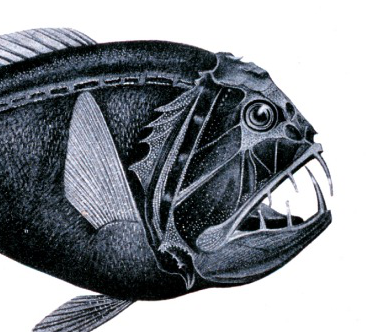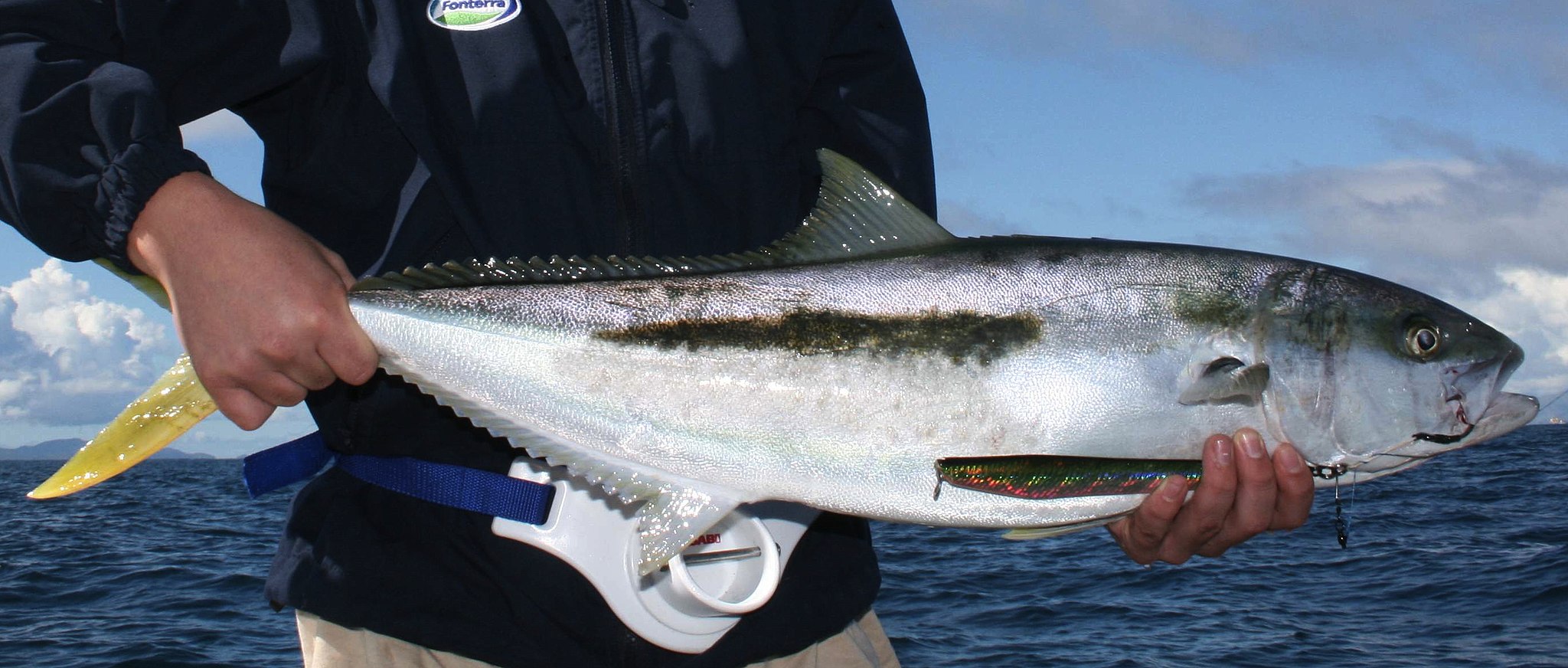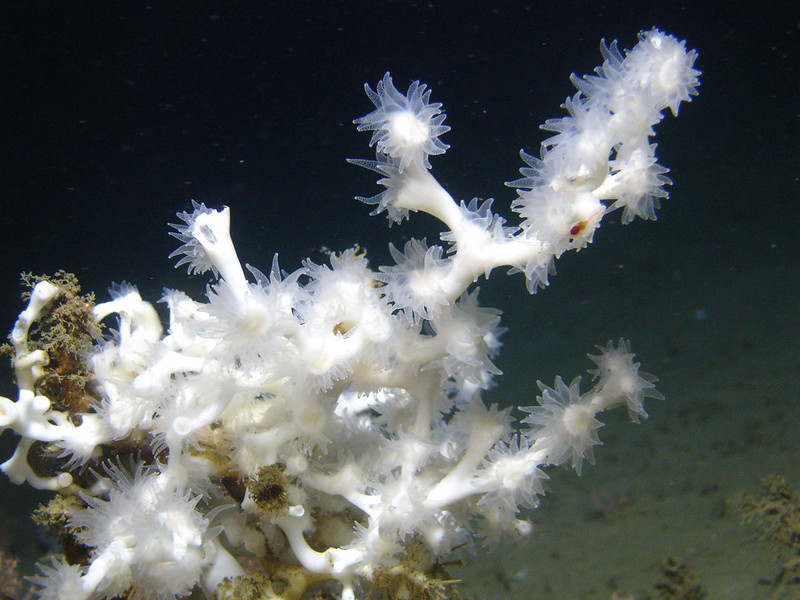Reference: Frommel, A. Y., Brauner, C. J., Allan, B. J., Nicol, S., Parsons, D. M., Pether, S. M., … & Munday, P. L. (2019). Organ health and development in larval kingfish are unaffected by ocean acidification and warming. PeerJ, 7, e8266.
Global warming is changing our oceans in many ways, presenting a host of dangers for marine life; among them is hindered development of the body and organs of baby fish. Now, scientists have discovered that the offspring of at least one fish species, yellowtail kingfish, may be safe from the risks posed by warmer and more acidic water.
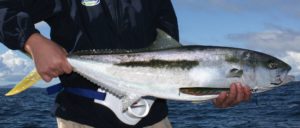
Climate change is affecting the oceans in two ways. First, and perhaps most obvious, it is raising ocean temperatures across the world, including in the habitat where these fish dwell. Second, excessive carbon dioxide causes buildup of hydrogen ions in the ocean. As hydrogen ions are acidic, they decrease the pH of the water, bringing it closer to the low pH of acids. This process is known as ocean acidification.
Yellow kingfish are subtropical fish that live in the Pacific and Indian ocean and are often raised in fisheries for food. As the ocean is expected to get warmer and more acidic in the future, scientists want to find out how this might affect the growth and rearing of those such as the yellowtail kingfish, an important food source for many people in the world.
What’s in it for baby fish?
All existing species have been shaped by billions of years of evolution to grow and thrive in their environment. Over time, marine animals have evolved to live in environments with specific seawater conditions, their young being particularly vulnerable to changes. Having the right water temperature and acidity is important for baby fish – or larvae – to stay healthy and develop properly. Damage to the organs caused by high temperature and acidity can cause larvae to die before they reach adulthood.
To see how lower pH and higher temperature may affect the development of yellowtail kingfish larvae, a collaboration of scientists from Canada, Australia, New Zealand, and New Caledonia examined the development of yellowtail kingfish in a study published in PeerJ.
Raising fish
The team designed their experiments based on the lifestyle of yellowtail kingfish. As these fish dwell in subtropical waters, their larvae prefer the water to be at a warm 21° Celsius (C), or 70° Fahrenheit, but they are also sometimes reared at a toasty 25°C (77°F) for faster growth. According to the study authors, the temperature of the subtropical waters of New Zealand, where the study was conducted, may rise to 25°C over this century because of climate change, so the study was designed to see how larval yellowtail kingfish fare at these two temperatures.
The scientists also manipulated the amount of carbon dioxide in the water where the fish larvae were raised. Current concentrations of carbon dioxide in the ocean correspond to a pH of about 8, which is slightly more basic than tap water. The researchers also raised larvae in more acidic water with a pH of about 7.8.
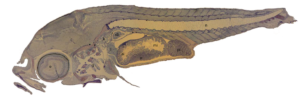
The yellowtail kingfish larvae were reared in one of four conditions: cooler water (21°C) and low acidity, warmer water (25°C) and low acidity, cooler water and high acidity, and warmer water and high acidity. This experimental design allowed to see if water acidity and warmth together had different effects on larval well-being that separately.
A look on the inside
Freshly hatched larvae lived in these four conditions for 11 days, after which they were collected and euthanized.
The researchers sliced the fish bodies into very thin sections and stained them with toluidine blue – a laboratory dye that binds to different parts of cells in tissues, coloring cell nuclei blue and carbohydrates purple. The blue and purple stains allow scientists to examine tissue structures for defects.
The team examined a variety of organs, including eyes, kidneys, and livers, looking for damage, such as abnormally small organs or tissue swelling. They then scored the amount of damage in each organ on a scale from 1 to 4, where 1 was normal tissue and 4 was dying tissue.
Unexpectedly, the scientists did not find any meaningful differences in the amount of organ damage between any of the conditions. Neither warmth nor acidity of the water affected the health of developing fish organs. Only the liver appeared to be somewhat affected, but its damage was not significant when put in numbers.
Too good to be true?
This surprising finding contradicts many other studies that warn against the ill effects of ocean acidification on proper development of fish offspring. In fact, in their other studies, the authors found organ defects in baby Atlantic cod and Atlantic herring that were raised in acidic water. However, those other studies used water with higher acidity levels than this study, so it is still unclear whether yellowtail kingfish larvae would be harmed by comparably acidic water. Additionally, the effects of living in warm acidic water might not manifest until later in life. If the researchers raised the larvae to adulthood, rather than only to eleven days old, they might have seen more damage in fully developed organs.
The researchers also noted that there could be an explanation for this surprising finding. The amount of organ damage varied greatly among individual fish within all four water conditions. Even though some larvae were raised in the same water conditions, they were still very different from each other. Because of this, any differences between larvae from different water conditions were not very meaningful.
Despite these limitations, this study is still encouraging because it has shown that yellowtail kingfish, which is an important food species, can form normally even in warmer and more acidic water than their natural habitat.
I am a PhD candidate at Northeastern University in Boston. I study regeneration of the nervous system in water salamanders called axolotls. In my free time, I like to read science fiction, bake, go on walks around Boston, and dig up cool science articles.
